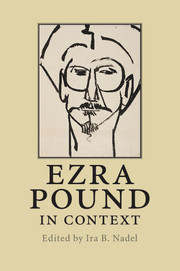Book contents
- Frontmatter
- Contents
- Notes on contributors
- Acknowledgements
- Chronology
- List of abbreviations and note on references to The Cantos
- Introduction
- Part I Biography and works
- Part II Historical and cultural context
- 16 The classics
- 17 Provençal and the troubadours
- 18 Dante and early Italian poetry
- 19 America
- 20 Venice
- 21 London
- 22 Paris
- 23 Rapallo and Rome
- 24 Pisa
- 25 Imagism
- 26 Vorticism
- 27 Music
- 28 Visual arts
- 29 Confucius
- 30 The Orient
- 31 Little magazines
- 32 Publishing and publishers
- 33 Modernism
- 34 Fascism
- 35 Anti-Semitism
- 36 Gender and sexuality
- 37 Race
- 38 Travel
- Part III Critical reception
- Further reading
- Index
31 - Little magazines
Published online by Cambridge University Press: 05 July 2014
- Frontmatter
- Contents
- Notes on contributors
- Acknowledgements
- Chronology
- List of abbreviations and note on references to The Cantos
- Introduction
- Part I Biography and works
- Part II Historical and cultural context
- 16 The classics
- 17 Provençal and the troubadours
- 18 Dante and early Italian poetry
- 19 America
- 20 Venice
- 21 London
- 22 Paris
- 23 Rapallo and Rome
- 24 Pisa
- 25 Imagism
- 26 Vorticism
- 27 Music
- 28 Visual arts
- 29 Confucius
- 30 The Orient
- 31 Little magazines
- 32 Publishing and publishers
- 33 Modernism
- 34 Fascism
- 35 Anti-Semitism
- 36 Gender and sexuality
- 37 Race
- 38 Travel
- Part III Critical reception
- Further reading
- Index
Summary
With signature aplomb, Ezra Pound wrote in 1928, in the back of the fourth number of his magazine The Exile, about “the periodicals in which the struggle took place.” What we now call modernism had been articulated by this time, and Pound had secured an enviable reputation within the movement; F. R. Leavis later credited him with having helped affect “a new start” and “a decisive reordering of the tradition of English poetry.” By the end of the 1920s, the literary establishment was “ready to feed almost anyone who will write anodyne monographs about” the poetic upheaval in which he had participated, Pound noted, even though it “would never have fed” at the time “any of the men who did the work.”
Little magazines, launched without the prospect of commercial success, had provided necessary support, though the esteem in which he held The Dial, The Egoist, The English Review, The Little Review, Poetry, and The Transatlantic Review scarcely implied the scope of his own engagement with such publications. Ezra Pound's Poetry and Prose, a collection of his periodical work over a period of seventy years compiled by Lea Baechler, A. Walton Litz, and James Logenbach, fills eleven quarto volumes, and Donald Gallup's bibliography lists more than seven hundred contributions to magazines before Pound himself launched The Exile. Mark Morrisson points out that while modernist periodicals often “found only small readerships and led brief lives,” writers used these publications to demonstrate to their readers “a lively, even exhilarating, awareness of opposition” to the literary establishment “and of the possibilities that the new century provided for an alternative art to become part of the public sphere.”
- Type
- Chapter
- Information
- Ezra Pound in Context , pp. 345 - 355Publisher: Cambridge University PressPrint publication year: 2010

